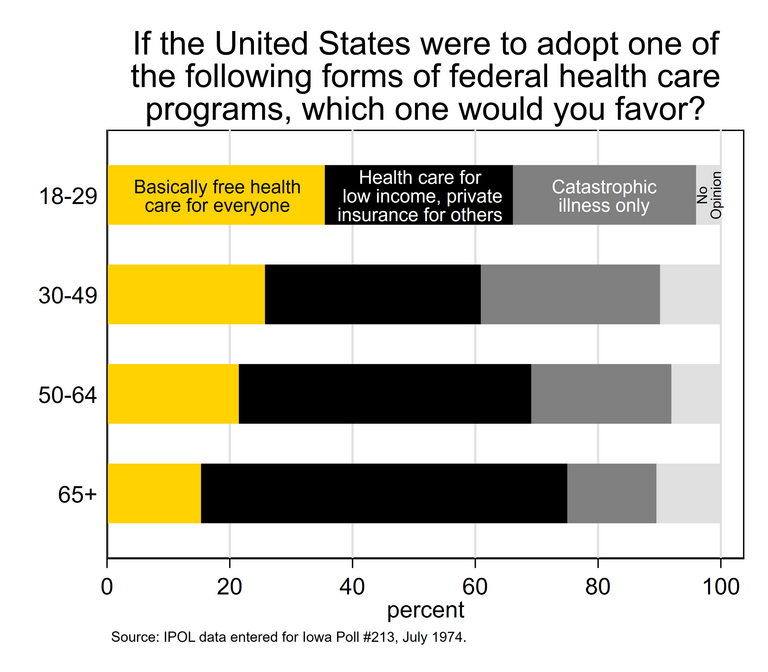Data restored from a 1974 Iowa Poll shows that Iowans favored federal health care for low income people over free health care for everyone or catastrophic health care only. It also shows a strong split by age, with support for free health care for everyone strongest amongst younger respondents. These data come from Iowa Poll #213, a random sample survey of 601 Iowans from July of 1974, which has been restored as part of a larger project to recover lost data from past Iowa polls.

Respondents were asked, “If the United States were to adopt one of the following forms of federal health care programs, which one would you favor?”, with the ability to answer, “Basically free health care for everyone”, “Health care for low income, private insurance for others”, “Health care for catastrophic illness only”, or “No opinion”. A plurality of respondents (42.4%) supported free health care for low-income people and private insurance for others. Nearly half of respondents supported either universal free healthcare or free health care for serious illness only, with roughly equal shares of respondents picking each option (24.5% and 24.7% respectively).
Respondents’ answers varied across different age groups. Respondents aged 18-29 were the least likely to support health care for low-income persons only of any surveyed age group, with 30.7% of them selecting “Health care for low income, private insurance for others” compared to 59.7% of respondents aged 65 or older. Older respondents were also increasingly less likely to support universal free healthcare or free healthcare for serious illnesses only: “Basically free healthcare for everyone” and “Healthcare for catastrophic illness only” were picked by 15.3% and 14.52% of respondents aged 65 or older, respectively, while support amongst respondents aged 18-29 for each option was 35.48% and 29.84%, respectively. Interestingly, this trend of increasing support for free low-income healthcare and decreasing support for universal and restricted free healthcare amongst older respondents holds for the intermediary age categories (respondents aged 30-49 and respondents aged 50-64) too; the older a respondent was, the more likely they were to support the mixed position and less likely they were to support an extensive or restrictive approach.
Iowa Poll #213, conducted by the Des Moines Register, was administered to a random sample of Iowans in July 1974. In addition to the questions about health care, the survey asked respondents their opinions on a wide variety of topics, including the economy, inflation, tax policy, and multiple sets of questions related to Watergate. Understanding Iowans’ past opinions on these topics can help us understand how perspectives have changed and what ideas have remained popular. IPOL has also been working with UI Libraries and the Des Moines Register to restore data from dozens of Iowa Polls from the 1960s to early 1980s. More information about the project can be found here. We are working to release a full report on our findings as we analyze additional questions.